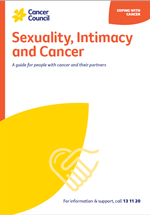- Home
- Cancer of the uterus
- Managing side effects
- Vaginal narrowing and dryness
Vaginal narrowing and dryness
Radiation therapy to the pelvic area can cause vaginal tissue to lose its elasticity and shrink, narrowing the vagina (vaginal stenosis). If your ovaries were removed, your vagina may also become dry.
Learn more about:
Overview
Vaginal narrowing and dryness may make it painful to have sex or pelvic examinations. Even if you don’t plan to have sex again, your doctor will need to do regular pelvic examinations after treatment, so it is important to prevent these side effects. Your treatment team may recommend using a vaginal moisturiser or lubricant or a hormone cream (available on prescription and safe with many cancers of the uterus). They may also advise you to use vaginal dilators.
Using vaginal dilators

Vaginal dilators can help keep your vagina open and flexible after treatment. They are made from plastic or silicone and come in a range of sizes. You usually start with the smallest dilator, and as each one becomes more comfortable, you can move on to using the larger dilators. Make sure any soreness has settled down before you start using dilators (usually 4–6 weeks after your last radiation therapy session).
To use the dilator, find a private space. Apply a water-based lubricant to the dilator, slowly insert it into the vagina, then gently rotate it. Leave the dilator in for 5–10 minutes. You can do this once or twice a day for the first few months, and then 2–3 times a week for several months after that, as advised by your treatment team.
You may also like to see a women’s health physiotherapist. If you have a history of sexual trauma, speak with a psychologist or counsellor.
→ READ MORE: Changes to sexuality and intimacy
Podcast: Sex and Cancer
Listen to more of our podcast for people affected by cancer
More resources
A/Prof Orla McNally, Consultant Gynaecological Oncologist, Director Oncology/Dysplasia, Royal Women’s Hospital, Honorary Clinical Associate Professor, University of Melbourne, and Director of Gynaecology Tumour Stream, Victorian Comprehensive Cancer Centre, VIC; A/Prof Yoland Antill, Medical Oncologist, Peninsula Health, Parkville Familial Cancer Centre, Cabrini Health and Monash University, VIC; Grace Guerzoni, Consumer; Zeina Hayes, 13 11 20 Consultant, Cancer Council Victoria; Bronwyn Jennings, Gynaecology Oncology Clinical Nurse Consultant, Mater Hospital Brisbane, QLD; A/Prof Christopher Milross, Director of Mission and Radiation Oncologist, Chris O’Brien Lifehouse, NSW; Mariad O’Gorman, Clinical Psychologist, Liverpool Cancer Therapy Centre and Bankstown Cancer Centre, NSW.
View the Cancer Council NSW editorial policy.
View all publications or call 13 11 20 for free printed copies.
Need to talk?
Support services
Life after cancer treatment
Webinars, exercise and nutrition, sexuality programs, and back-to-work support
Need legal and financial assistance?
Pro bono services, financial and legal assistance, and no interest loans
Cancer information
Sexuality, intimacy and cancer
Ways to adapt when cancer treatment affects your sexuality
Resource hub
Guides, fact sheets, videos, podcasts and more for people with cancer, their families and friends

